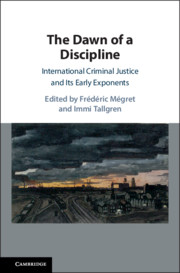Book contents
- Reviews
- The Dawn of a Discipline
- The Dawn of a Discipline
- Copyright page
- Contents
- Contributors
- Foreword
- 1 Introduction
- 2 Hugh H. L. Bellot
- 3 Vespasian V. Pella
- 4 Emil Stanisław Rappaport
- 5 International Criminal Justice as Universal Social Defence
- 6 Henri Donnedieu de Vabres
- 7 Not Just Pure Theory
- 8 Principled Pragmatist?
- 9 Retelling Radha Binod Pal
- 10 Aron Trainin
- 11 The Complex Life of Rafal Lemkin
- 12 Stefan Glaser
- 13 Yokota Kisaburō
- 14 Jean Graven
- 15 Absent or Invisible?
- Index
3 - Vespasian V. Pella
International Criminal Justice as a Safeguard of Peace, 1919–1952
Published online by Cambridge University Press: 04 September 2020
- Reviews
- The Dawn of a Discipline
- The Dawn of a Discipline
- Copyright page
- Contents
- Contributors
- Foreword
- 1 Introduction
- 2 Hugh H. L. Bellot
- 3 Vespasian V. Pella
- 4 Emil Stanisław Rappaport
- 5 International Criminal Justice as Universal Social Defence
- 6 Henri Donnedieu de Vabres
- 7 Not Just Pure Theory
- 8 Principled Pragmatist?
- 9 Retelling Radha Binod Pal
- 10 Aron Trainin
- 11 The Complex Life of Rafal Lemkin
- 12 Stefan Glaser
- 13 Yokota Kisaburō
- 14 Jean Graven
- 15 Absent or Invisible?
- Index
Summary
Vespasian V. Pella was Romanian jurist who dedicated his life to creating a system of international justice that would prevent war, punish atrocity, and vindicate humanity’s political and economic rights, objectives that he considered connected and indivisible. This chapter traces the origins of this project to Pella’s early commitment to republican, socialist, and internationalist ideals, a deeply personal interest in the psychology of individuals and crowds, and, especially, his reaction to the atrocities of World War I. War was what prompted Pella to campaign for the “international criminal law of the future,” a novel approach that combined the protection of social rights, the unification of domestic criminal law, and international and domestic criminal responsibility for states and individuals, with international institutions capable of playing a subsidiary role in resolving disputes, imposing sanctions, and punishing aggression and violations of the laws of war. Although Pella was successful in mobilizing professional support for his ideas, the political support necessary to bring his system to life never materialized. The chapter overturns many misconceptions surrounding Pella and is the most thorough study to date of his life and work
Keywords
- Type
- Chapter
- Information
- The Dawn of a DisciplineInternational Criminal Justice and Its Early Exponents, pp. 49 - 92Publisher: Cambridge University PressPrint publication year: 2020



